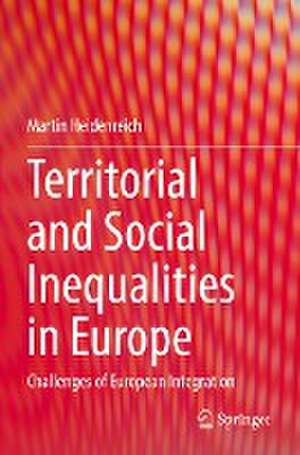Territorial and Social Inequalities in Europe: Challenges of European Integration
Autor Martin Heidenreichen Limba Engleză Paperback – 29 oct 2023
This book examines social inequalities in Europe, especially those caused by economic factors. It starts with the paradox of European inequality, where on the one hand, even total income inequality in Europe is significantly lower than in most parts of the world; but on the other, Europe is also characterised by profound and durable inequalities within the continent. It discusses inequalities caused by the exclusion of marginalised groups from the labour market, with considerable and sometimes increasing differences between central and peripheral regions, pronounced wealth and labour market inequalities, and significant rates of persistent poverty, deprivation, educational poverty, low wages and unemployment. The book also discusses broader territorial inequalities, which are the basis for divisions between Northern and Southern Europe, East and West, between qualified and unqualified employees, younger and older people, men and women, and migrants and non-migrants. The book raises questions about the winners and losers of the social transformations linked to the introduction of the Euro, the Eastern enlargement of the EU, and the financial and Eurozone crises. It is based on a comprehensive analysis of a European-wide microdata set on income and living conditions (EU-SILC). The empirical research material, which is the first to deploy this data in a comprehensive manner, consists of detailed empirical analyses of social divisions and Europeanisation processes in 30 European countries. It analyses and explains the transformation of the previously dominant national spaces into a European social space.
This topical book is of interest to academics and students in the fields of sociology and comparative social sciences, along with those studying European regional geography, anthropology, international relations, and international politics.Toate formatele și edițiile
| Toate formatele și edițiile | Preț | Express |
|---|---|---|
| Paperback (1) | 784.48 lei 6-8 săpt. | |
| Springer International Publishing – 29 oct 2023 | 784.48 lei 6-8 săpt. | |
| Hardback (1) | 789.52 lei 3-5 săpt. | |
| Springer International Publishing – 29 oct 2022 | 789.52 lei 3-5 săpt. |
Preț: 784.48 lei
Preț vechi: 956.68 lei
-18% Nou
Puncte Express: 1177
Preț estimativ în valută:
150.11€ • 154.86$ • 125.27£
150.11€ • 154.86$ • 125.27£
Carte tipărită la comandă
Livrare economică 27 martie-10 aprilie
Preluare comenzi: 021 569.72.76
Specificații
ISBN-13: 9783031126321
ISBN-10: 3031126327
Pagini: 347
Ilustrații: XIX, 347 p. 60 illus., 13 illus. in color.
Dimensiuni: 155 x 235 mm
Greutate: 0.51 kg
Ediția:1st ed. 2022
Editura: Springer International Publishing
Colecția Springer
Locul publicării:Cham, Switzerland
ISBN-10: 3031126327
Pagini: 347
Ilustrații: XIX, 347 p. 60 illus., 13 illus. in color.
Dimensiuni: 155 x 235 mm
Greutate: 0.51 kg
Ediția:1st ed. 2022
Editura: Springer International Publishing
Colecția Springer
Locul publicării:Cham, Switzerland
Cuprins
- 1. Introduction. - 2. Social Inequalities at the National and European Level. - 3. Data and Methods. - 4. Between Convergence and Agglomeration. Economic and Technological Disparities in the EU. - 5. European Labour Markets between Segmentation and Activation. - 6. Wage Inequalities in the EU. - 7. Europeanisation of Income Inequality Before and During the Eurozone Crisis: Inter-, Supra- and Transnational Perspectives. - 8. Cumulative Risks of Poverty and Exclusion. - 9. Education, Occupational Skills and Social Mobility. - 10. Wealth Inequality and Housing in Europe. - 11. Social Cohesion in Europe. Between Europe-Wide Convergence and Social and Territorial Inequalities.
Notă biografică
Martin Heidenreich studied sociology and business administration in Bielefeld, Bologna und Paris. He has the Jean-Monnet Chair for European Studies in Social Sciences and is Director of the Jean Monnet Centre for Europeanisation and Transnational Regulations at the University of Oldenburg. He has published over 170 articles and books on regional innovation systems, multinational companies and the Europeanisation of national employment policies and patterns of social inequality. Recently, he coordinated two EU-financed multinational research projects on social and employment policies and a DFG-funded research group on horizontal Europeanisation.
Textul de pe ultima copertă
This book examines social inequalities in Europe, especially those caused by economic factors. It starts with the paradox of European inequality, where on the one hand, even total income inequality in Europe is significantly lower than in most parts of the world; but on the other, Europe is also characterised by profound and durable inequalities within the continent. It discusses inequalities caused by the exclusion of marginalised groups from the labour market, with considerable and sometimes increasing differences between central and peripheral regions, pronounced wealth and labour market inequalities, and significant rates of persistent poverty, deprivation, educational poverty, low wages and unemployment. The book also discusses broader territorial inequalities, which are the basis for divisions between Northern and Southern Europe, East and West, between qualified and unqualified employees, younger and older people, men and women, and migrants and non-migrants. The book raises questions about the winners and losers of the social transformations linked to the introduction of the Euro, the Eastern enlargement of the EU, and the financial and Eurozone crises. It is based on a comprehensive analysis of a European-wide microdata set on income and living conditions (EU-SILC). The empirical research material, which is the first to deploy this data in a comprehensive manner, consists of detailed empirical analyses of social divisions and Europeanisation processes in 30 European countries. It analyses and explains the transformation of the previously dominant national spaces into a European social space.
This topical book is of interest to academics and students in the fields of sociology and comparative social sciences, along with those studying European regional geography, anthropology, international relations, and international politics.Caracteristici
Analyses crucial dimensions of social inequality in 30 European countries Exhaustively covers the field of economically induced social inequalities Uses a unique microdata set for the period of EU expansion, financial crisis, and Brexit
